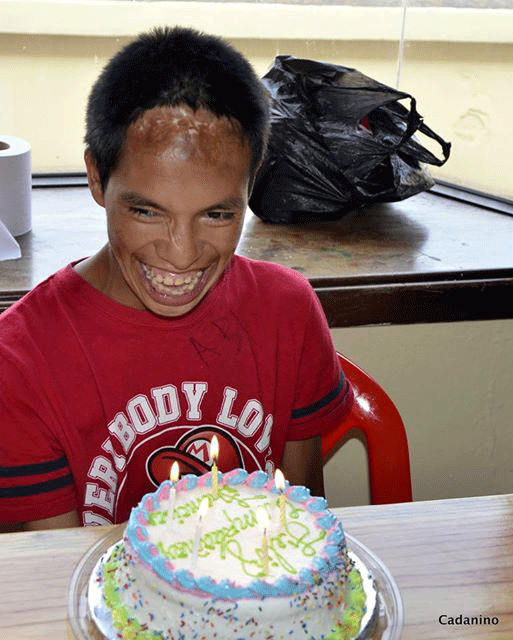
By Michael Ashcraft —
When a New York tycoon met one of the last feral “Tarzan boys” in Guatemala, he knew it was a match made in Heaven.
Jamie Waller, a Wall Street darling who recovered from alcoholism and became a missionary, took on what was to become perhaps his most difficult case, helping a boy who became a savage after he was abandoned following the death of his parents, forced to fend for himself in the jungle.
That boy, Francisco Tzoy – who suffered from mental disability — crawled on all fours and fought off dogs for his food in the dense mountainous terrain of Guatemala. Francisco is now diagnosed with the mental age of a 9-month-old.
Thanks to God working through Waller and the Guatemalan government, he now keeps his clothes on, stands on his feet, smiles and no longer eats his own excrement.
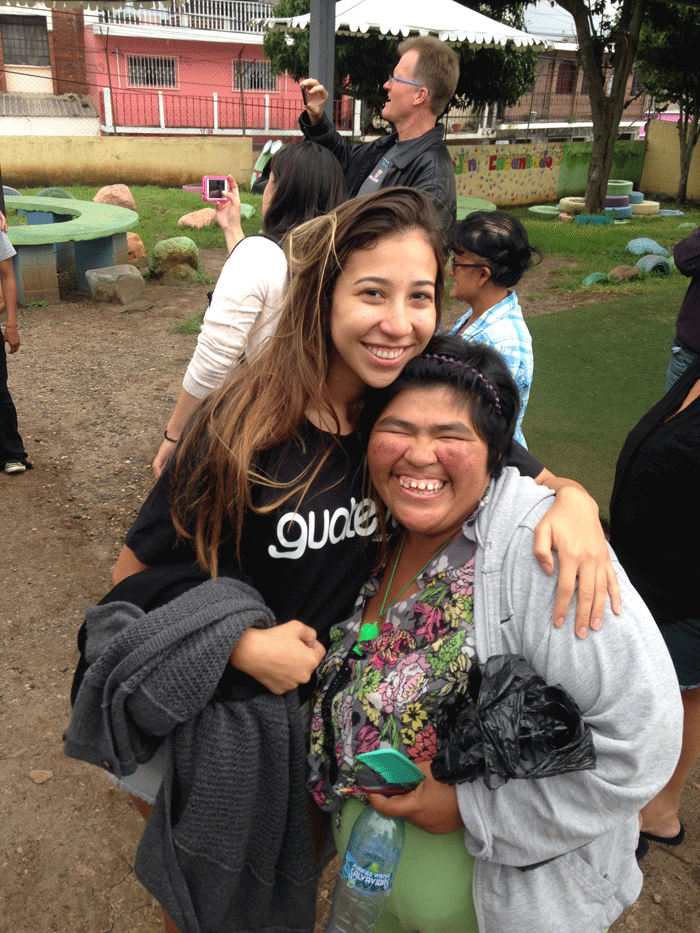
“That’s a good success story,” Waller said. “He can sit still, play a little bit. He doesn’t scream all the time anymore. He can participate in group activities. Prayer has been big. People have been praying for him and with him throughout. His infectious smile touches me. When he’s happy, the whole world smiles with him.”
A New Jersey native, Waller started using drugs in boarding school in the 1970s. He drank daily through college. When he started having kids and getting into corporate life, he limited his liquor consumption to weekend drinking.
In 1987, he got sober through a 12-step program. His relationship with Jesus “evolved” from superficial towards a more conservative, more Bible-believing Christianity. He accepted Jesus as his Lord and Savior in 1993.
His software company analyzing investment portfolios went big with on-line trading in the mid-1990s and then sold to Check Free.
Waller was in building 7 of the World Trade Center when 9/11 struck and managed to evacuate from the 47th floor before his building, not hit by the planes but affected by the ensuing aftermath, burned down.
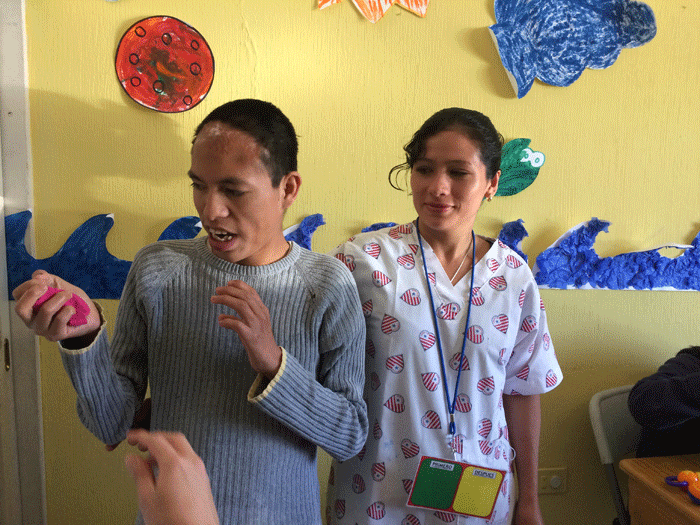
Next, Waller specialized in software company turnarounds. After a string of successes, he experienced a “colossal failure” in 2008 with an “unsalvageable” company, a jolt in his career that made him start thinking about humanitarian work.
In 2009, his wife left him. While this was another boat-rocker in his life, it seemed at the same time to open doors for him to travel and do ministry. He flew to Guatemala with his son and visited 10 orphanages. The last hospital he visited so moved him that it became the one he now works in.
“It was the Holy Spirit,” Waller said of the remarkable career boomerang. “I worked in New York and wore a suit to work. I never had real interest in special needs folks. I probably was guilty of ignoring them like most people do. The Lord changed my heart. Something clicked in my head when I visited this one. I was only there for an hour, but it changed my life.”
Though he had no background with special needs patients, he threw himself into the work in 2009. He hired a physical therapist to “volunteer” at the Abrigo Bienestar Integral home to give the patients some badly needed stimuli. He prodded government officials to make ABI less of an institution where patients were kept behind bars and more of a center of joy and improving patients with their social skills.
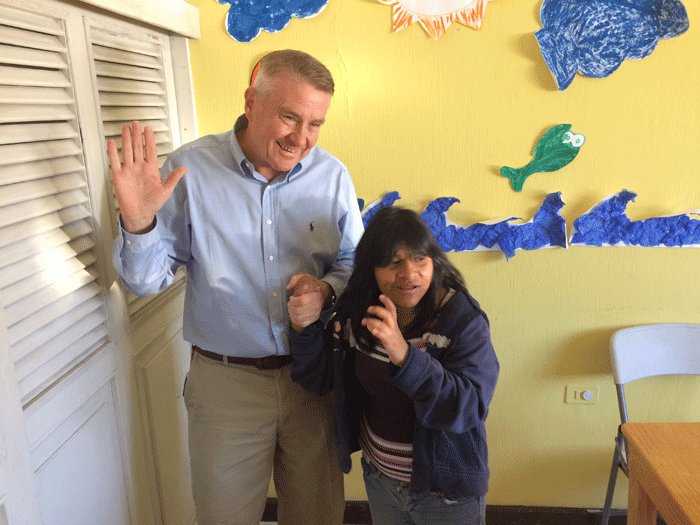
Today, Waller runs a 12-member staff on a $50,000 budget through Fundaniños, and they serve at a government-funded institution that houses and cares for some 100 special needs patients abandoned or abused by their families.
In eight years of service, he has opened an annex facility that during the day takes some of the higher-functional patients and provides them physical therapy and improves motor and cognitive skills.
Perhaps their most remarkable story of transformation involves their former Tarzan boy, Francisco.
When two police agents spotted him in May of 2010 cowering among the brush of rural Santa Cruz of Quiché, they first thought he was a wolf. He emitted guttural sounds and moved around on all fours. His unkempt, matted hair flowed all over his naked body.
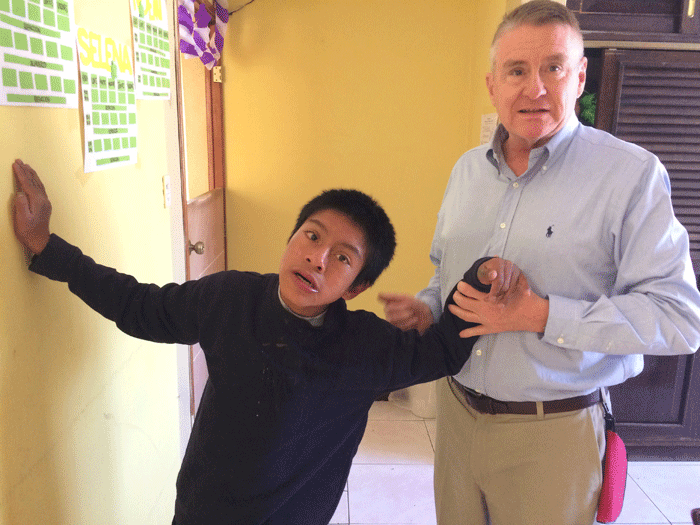 After further observation, they realized Francisco was a boy of 13. They captured and took him to the local hospital. Investigations produced his name and story. His parents had both died of alcoholism. Uncles and aunts didn’t want to take care of him because profound mental disability required attention 24/7.
After further observation, they realized Francisco was a boy of 13. They captured and took him to the local hospital. Investigations produced his name and story. His parents had both died of alcoholism. Uncles and aunts didn’t want to take care of him because profound mental disability required attention 24/7.
Left to his own, little Francisco adapted to the surrounding mountains. Sometimes he came into town and slept underneath trucks. He fought with dogs for scraps of food people left.
He was a true Tarzan child, believed to be the seventh and one of the last feral children in modern times.
“We called him the caveman child in the hospital because he had hair to the waist and walked on all fours,” said Norma Lizette Rivera in El Español. She cared for him for a year-and-a-half until he was transferred to Guatemala City where he could get better care.
They had nursed him out of malnutrition. It was at first almost impossible to bathe him. He was burned by the sun and showed scars, which care-givers determined were self-inflicted, not from an animal attack. He ripped out bunches of hair.
When Francisco came to ABI, Jamie’s employees began to work with him. One made an unexpected discovery. Francisco grew calm and happy if he was given a red shoe lace. Not a blue one. Not a green one. Not any other color. It had to be red. It was his decision – completely arbitrary, but proof of cognitive improvement.
Suddenly the kid who never smiled discovered his first toy. To date, Francisco needs the red string like a pacifier. He’s stopped harming himself. He learned to no longer scatter his feces around his room. He enjoys music.
“One of my staff, Lorena Hernandez, worked miracles with that kid,” Waller said.
Another success story is Hector Cinto, a 16-year-old whose severe seizures left his feet bent backwards. When he came to ABI, he could stand leaning against the wall on what would be the tops of his feet if he were normal. Thanks to three operations, Hector now has his feet in normal position and can stand and walk with help. He also suffers from severe cerebral palsy and requires expensive medicines provided by the Guatemalan government, Waller said.
Also there is Yolanda who suffers from rumination syndrome, a habitual regurgitation in some cognitively impaired patients that provides a satisfactory jolt to the brain from acid in the mouth as a compensation for under-stimulation.
One of his patients with physical deformity was “rented out” by his family to beggars who would get bigger hauls from the gush of pity he generated, Waller said.
The world of help for the neurologically impaired is moving towards de-institutionalization, but as with many things Guatemala is lagging behind the trend. This is where Waller has a great collaboration with the ABI director and staff, he said.
He not only provides them with “volunteer” staff members and his annex (Centro de Estimulación Integral), he also pitches in bringing public attention to the needs of the neurologically impaired and recruit politicians to the cause of funding better programs.
Half of ABI´s population suffers seizures, and 80% require expensive psychiatric medicines to normalize their brain waves and control erratic behavior.
ABI was chosen to house 43 survivors of a fire on March 7 at the Virgen de la Asunción center that killed 40 girls reportedly locked in a room. ABI was overwhelmed and lacked the resources for the crush of new patients, so Waller has tried to ease the crunch by receiving several residents at his annex during the day.
Under normal circumstances, a visit to ABI´s grounds can be both heart-breaking and heart-warming. To see the tragic disabilities, makes you cry. But to see their joy in the yard restores your conviction of the sanctity of life. To see the compassion of the workers restores your faith in humanity.
“I don’t see handicapped people as handicapped anymore,” Waller said. “I see them just as people.”
If you want to know more about a personal relationship with God, go here.
Michael Ashcraft is the founder of the Liceo Bilingüe La Puerta Christian school in Guatemala.




It seems one of the greatest medicines is LOVE!!! Thank you Jesus for bringing these missionaries to serve Your children in need!!!
Comments are closed.